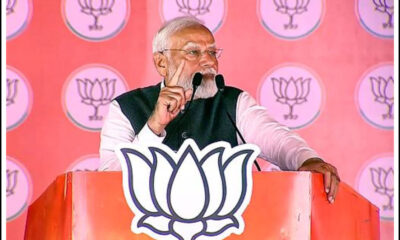COP28
India Participates in COP28’s UN “Race to Resilience”
Published
5 months agoon

India announced that it will be taking part in the UN’s worldwide initiative, ‘Race to Resilience,’ which aims to address climate change issues during COP28 in Dubai
India’s participation in the UN’s worldwide “Race to Resilience” program is a major step in tackling the problems caused by climate change. This choice, which was made public during the just finished COP28 conference in Dubai, demonstrates India’s dedication to enhancing climate resilience in its metropolitan centers.
Context: “The Race to Resilience”
A global platform called “Race to Resilience” seeks to bring together investors, corporations, cities, regions, civil society, and non-state players. By 2030, the objective is to increase the most vulnerable communities’ resistance to the effects of climate change.
This program, which was started in 2020, provides a collaborative platform for the development and use of policies that reduce the risks associated with climate change and create resilient urban settings.
C-Cube and the ClimateSmart Cities Assessment Framework (CSCAF) play a key role for NIUA.
The Ministry of Housing and Urban Affairs’ independent Climate Centre for Cities (C-Cube) at NIUA will be a key player in leading India’s participation in the “Race to Resilience.”
The ClimateSmart Cities Assessment Framework (CSCAF) was developed and implemented with active participation from C-Cube. This approach focuses on climate-relevant criteria unique to Indian cities, making it a ground-breaking tool for city assessments.
Read also:-West Indies defeated England by four wickets: Russell returned after two years, took three wickets, and scored 29 runs; West Indies now lead the series 1-0
Under the CSCAF framework, C-Cube is currently conducting its third set of assessments for 220 cities around India. Urban planning, biodiversity, green cover, energy efficiency, green buildings, mobility, air quality, water management, and waste management are just a few of the many areas covered by the assessments.
Principal Projects: Modules of the ClimateSmart Cities Assessment Framework
C-Cube has effectively created and delivered 26 training modules within the CSCAF framework. With an emphasis on resilience and sustainability in particular, these programs aim to improve many facets of urban planning and development. Key topics covered in the program include:
1. Urban Planning and Design: Methods for coordinating urban expansion with lower intensity emissions of greenhouse gases (GHGs).
2. Green Cover and Biodiversity: Urban green space promotion and enhancement initiatives.
3. Energy and Green Buildings: Recommendations for sustainable infrastructure and energy-efficient construction techniques.
4.Mobility and Air Quality: Efforts to enhance air quality issues and transportation infrastructure.
5. Water Management: Ecological methods for effective city water usage and management.
6. garbage Management: Techniques to encourage efficient recycling and garbage disposal.
India’s Urban Future
One important factor is India’s fast urbanization. Forty percent of India’s population is predicted to live in cities by 2030.
The Director of NIUA, Debolina Kundu, highlights the significance of coordinating urban growth with a decrease in greenhouse gas emissions and enhancing cities’ ability to recover efficiently from extreme weather events and hazards associated with climate change.
Strategic Collaboration for Ecological Advancement
India hopes to make a major contribution to the global effort to address climate change by promoting sustainable development, constructing resilience, and enabling cities to withstand environmental, social, and economic shocks.
Q. Which institution is spearheading India’s participation in the ‘Race to Resilience’?
Answer: The Climate Centre for Cities (C-Cube) at the National Institute of Urban Affairs (NIUA) is spearheading India’s participation in the ‘Race to Resilience.’
Q. What is the estimated percentage of India’s population residing in urban areas by 2030?
Answer: It is estimated that 40% of India’s population will be residing in urban areas by 2030.
Q. What specific areas does the CSCAF framework address in its assessments for Indian cities?
Answer: The CSCAF framework addresses a wide range of topics, including urban planning, green cover, biodiversity, energy and green buildings, mobility and air quality, water management, and waste management.
You may like
-


On the Citizenship Amendment Act (CAA), PM Narendra Modi challenges Congress and the SP
-


Shortly After Slovak PM’s Assassination, As Crowd Held Gunman
-


Vladimir Putin, the leader of Russia, makes a state visit to China as a symbol of the alliances’ solidarity
-


NASA: Bright, tiny, plant-like creatures discovered in the Celtic Sea
-


Earth’s North Pole is moving more quickly
-


Kiara Advani will make her Cannes Film Festival debut in 2024

